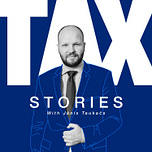Video of the conversation:
Pascal Saint-Amans has been a significant figure in international tax policy, now a partner at Brunswick, ex-director of OECD Centre for Tax Policy and Administration.
The discussion for the 1st time in Tax Stories history was not recorded online, but took place in Singapore, during WTS Global annual conference. Thus, the CEO of WTS Global Wim Wuyts participated in the discussion as well. BTW, a separate Tax Stories interview with Wim is available here.
There is some magic around the number 50 this time. Both Pascal and Wim are present in the ITR Global Tax 50 list of the most influential tax people in the world. This is episode no.50 of Tax Stories podcast. And the episode has been released as a nice present on my 50th birthday..
In the interview we discussed:
His book on offshores - Paradis Fiscaux (just in French so far);
Pascal offers there to have a look in the kitchen of the largest tax decisions globally - US tax reform, both Pillars, etc.
his new role at Brunswick to help companies to present their financial statements and tax reporting in a reader friendly language;
for more than 10 years there is a public attention to taxation of large companies;
companies now must not only pay more attention to taxation, but pay attention to explaining it to a larger public;
tax people know the law, but public just considers fairness - so, there is a gap that need to be bridged.
Success of development of Singapore;
the ease of doing business in Singapore has been impressive;
the low taxation system has been only a part of the story;
AI and taxing data;
there was a debate that extracting data is the new gold, like people used to extract minerals, and we should tax that new gold;
actually the value is in processing the data, and still have no magic recipe how to tax that;
Pillar 1 is the most likely solution with taxing consumption markets - as the market of the final customers is something companies cannot shift;
Pillar 1 vs digital services tax (or significant economic presence);
AI will replace the lower value jobs;
ESG - the US vs. Europe;
Currently about 60% of carbon emissions are not priced at all;
Taxation of carbon is regressive, so it is politically very difficult to implement;
But CBAM and other initiatives sets Europe as an example for the others;
US with subsidies will hurt the rest of the world as many move to the US;
Pascal also explained why there is no global solution on this - countries are not ready, although it’s an important issue; there is an emergency, but it’s not addressed like that, but it will come.
A look into the future, 5-10 years from now on;
PIT, VAT and tax collection might be 3 big issues for OECD to resolve;
With Pillar 1 & 2 tax administrations will get more information and money and will be able to relax and be more friendly to businesses;
There are unprecedented inequality in the world; taxes will try to make it right, mainly with taxes on capital - inheritance taxes (Pascal doesn’t believe in wealth tax) and on capital income - dividends and capital gains;
Brasil who is in charge of G20 as of December will put tackling inequality high in their agenda; there might be a push towards addressing those issues at the UN as well;
VAT is a tax that works pretty well; digitalization is the best way to fight the grey economy;
AI should be the best help to the tax authorities with collection;
For in-house professionals one way to reduce the anxiety caused by all the changes might be to learn more about tax policy - to understand better how the rule was built and where it is heading;
tax issues at some point will move to the board rooms and will be a part of the policy conversation, especially with ESG topics; tax experts thus will handle much more than just compliance;
Insights for future leaders - thinking out of box might be the receipt.
About 9-10k companies within the Pillar 2 threshold of EUR 750 mil. represent around 85% of all the profits made globally.
Besides, Subject to tax rules of Pillar 2 do not have a minimum threshold - it is imposing 9% on all businesses, including the out-of-scope; that’s why countries like UAE and Barbados are imposing 9% CIT;
Regarding countries or tax administrations as examples for others:
tax administrations are reluctant to be benchmarked, but some data can be found in the FTA report;
regarding tax systems countries first need to look - what does it finance (what’s the level of satisfaction of people with the public spending), and then examine if it’s compatible with the selected social model (Scandinavia vs. US, etc); then a selection can be made between regressive VAT and progressive income taxes.
France, for example, that is obsessed with equality issues has more progressive taxes, is collecting about 47% of GDP in taxes and still not satisfied with its system.
Video interview available on WTS web page.














Share this post